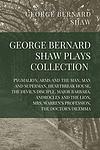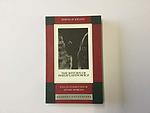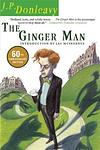The Greatest Russian, Irish, Croatian "Satire, Fiction" Books Since 1900
Click to learn how this list is calculated.
This list represents a comprehensive and trusted collection of the greatest books. Developed through a specialized algorithm, it brings together 305 'best of' book lists to form a definitive guide to the world's most acclaimed books. For those interested in how these books are chosen, additional details can be found on the rankings page.
Genres
Satire is a genre of literature that uses humor, irony, and exaggeration to criticize and ridicule human vices, follies, and shortcomings. It is a form of social commentary that aims to expose the flaws and absurdities of society, politics, and culture. Satirical books often employ sarcasm, wit, and parody to challenge the status quo and provoke thought and reflection in readers. Satire can be both entertaining and thought-provoking, and it has been used throughout history as a powerful tool for social and political critique.
Countries
Date Range
Reading Statistics
Click the button below to see how many of these books you've read!
Download
If you're interested in downloading this list as a CSV file for use in a spreadsheet application, you can easily do so by clicking the button below. Please note that to ensure a manageable file size and faster download, the CSV will include details for only the first 500 books.
Download-
1. Ulysses by James Joyce
Set in Dublin, the novel follows a day in the life of Leopold Bloom, an advertising salesman, as he navigates the city. The narrative, heavily influenced by Homer's Odyssey, explores themes of identity, heroism, and the complexities of everyday life. It is renowned for its stream-of-consciousness style and complex structure, making it a challenging but rewarding read.
The 3rd Greatest Book of All Time -
2. The Master and Margarita by Mikhail Bulgakov
This novel is a complex narrative that weaves together three distinct yet intertwined stories. The first story is set in 1930s Moscow and follows the devil and his entourage as they wreak havoc on the city's literary elite. The second story is a historical narrative about Pontius Pilate and his role in the crucifixion of Jesus Christ. The third story is a love story between the titular Master, a writer who has been driven to madness by the criticism of his work, and his devoted lover, Margarita. The novel is a satirical critique of Soviet society, particularly the literary establishment, and its treatment of artists. It also explores themes of love, sacrifice, and the nature of good and evil.
The 41st Greatest Book of All Time -
3. Waiting for Godot by Samuel Beckett
"Waiting for Godot" is a play that explores themes of existentialism, despair, and the human condition through the story of two characters, Vladimir and Estragon, who wait endlessly for a man named Godot, who never arrives. While they wait, they engage in a variety of discussions and encounter three other characters. The play is characterized by its minimalistic setting and lack of a traditional plot, leaving much to interpretation.
The 96th Greatest Book of All Time -
4. At Swim Two-Birds by Flann O'Brien
This novel is a complex, metafictional work that weaves together three separate narratives. The first is about a lazy, hard-drinking college student living with his uncle, the second is about a devilish Pooka and a loquacious old man, and the third is about a fictional character named Finn who seeks revenge on his author for creating him poorly. The narratives eventually intersect in a unique and humorous way, challenging traditional ideas of story structure and character autonomy.
The 296th Greatest Book of All Time -
5. We by Yevgeny Zamyatin
In this dystopian novel, the story is set in the future, where the protagonist, a mathematician, lives in a highly regulated society where citizens are known by numbers, not names, and every action is dictated by the state. Individuality and freedom are suppressed, and even the concept of love is replaced by regulated sexual liaisons. The mathematician begins to question the infallibility of the state after meeting a rebellious woman, leading to a series of events that challenge the very foundations of his world.
The 456th Greatest Book of All Time -
6. The Third Policeman by Flann O'Brien
"The Third Policeman" is a darkly comedic and surreal novel about a nameless narrator who, after committing a murder to raise funds for his scholarly obsession with a bizarre pseudo-scientific theory, finds himself wandering in an eerie, nightmarish landscape. He encounters strange characters, including a pair of eccentric policemen who are obsessed with bicycles, and becomes embroiled in a series of increasingly absurd and ludicrous situations. The novel explores themes of existence, reality, and the nature of hell, with a twist ending that forces the reader to question everything they've read.
The 465th Greatest Book of All Time -
7. Murphy by Samuel Beckett
The novel explores the life of the titular character, a disaffected and detached man living in London who prefers the realm of his own thoughts to the real world. After securing a job as a nurse at a mental institution, he becomes increasingly detached from reality. The narrative also delves into his relationships with various other characters, including his fiancée, his best friend and a prostitute. The book is known for its dark humor and its exploration of themes such as existentialism and the nature of human consciousness.
The 644th Greatest Book of All Time -
8. Petersburg by Andrei Bely
"Petersburg" is a symbolist novel set in the heart of Russia during the 1905 Revolution. It follows the story of a young man who is given the task of assassinating his own father, a high-ranking government official, by a radical political group. The narrative is a complex mix of politics, family drama, and philosophical introspection, all set against the backdrop of a city in turmoil. The novel is renowned for its vivid and poetic descriptions of the city itself, making Petersburg as much a character in the story as the people who inhabit it.
The 1049th Greatest Book of All Time -
9. Moscow Petushki by Venedikt Yerofeev
The book is a surreal and satirical narrative that takes the reader on a tragicomic journey aboard a suburban train from Moscow to the small town of Petushki. The protagonist, a disillusioned intellectual and alcoholic, engages in philosophical musings and encounters a variety of eccentric characters, each embodying different aspects of Soviet life. As he delves into ruminations on love, suffering, and the search for meaning amidst the absurdities of existence, the journey becomes a metaphor for the human condition and the societal decay of the USSR, blending dark humor with poignant introspection.
The 1169th Greatest Book of All Time -
10. Selected Plays of George Bernard Shaw by George Bernard Shaw
This collection features selected plays by a renowned playwright, showcasing his wit, social criticism, and talent for character development. The plays touch on a wide range of themes, including class struggles, the complexities of love, the absurdity of war, and the pursuit of individual freedom. The author's sharp dialogue and satirical approach make these plays both entertaining and thought-provoking, reflecting his progressive views and his belief in the potential for societal change.
The 1453rd Greatest Book of All Time -
11. Pnin by Vladimir Nabokov
The novel is about a Russian émigré, Timofey Pnin, who is a professor at an American college. Pnin struggles with the complexities of life, language, and American culture, while dealing with the traumas of his past in Russia. The book is a series of loosely connected episodes, filled with humor, pathos, and Pnin's endearing confusion. His struggles and triumphs in academia and his search for a home and identity form the crux of the story.
The 1566th Greatest Book of All Time -
12. The Clay Machine-gun by Victor Pelevin
"The Clay Machine-gun" is a surreal and complex novel that explores the nature of reality and illusion. The story is set in post-Soviet Russia and follows a protagonist who has multiple identities, including a poet in 19th-century Russia, a 20th-century psychiatric patient, and a 21st-century advertising executive. The narrative moves between these identities and realities, blurring the lines between them and creating a layered and philosophical exploration of Russian society, identity, and the human psyche.
The 2275th Greatest Book of All Time -
13. The Bedbug And Selected Poetry by Vladimir Mayakovsky
"The Bedbug And Selected Poetry" is a collection of poems by Vladimir Mayakovsky, a prominent Russian poet of the early 20th century. The book features a mix of Mayakovsky's avant-garde and politically charged works, showcasing his unique style and themes of revolution, love, and the struggles of the working class. Through his powerful and dynamic verses, Mayakovsky offers readers a glimpse into the social and cultural landscape of his time, while leaving a lasting impact with his thought-provoking and emotive poetry.
The 2285th Greatest Book of All Time -
14. Good Behaviour by Molly Keane
"Good Behaviour" is a darkly humorous and compelling novel that delves into the dysfunctional lives of the St. Charles family. Set in the early 20th century, the story is narrated by Aroon, the youngest daughter, who chronicles her family's eccentricities, secrets, and the complex dynamics that shape their relationships. As Aroon navigates her way through a world of privilege and societal expectations, she grapples with her own desires and the consequences of her actions. With sharp wit and keen observations, the novel explores themes of love, betrayal, and the lengths people will go to maintain appearances.
The 2334th Greatest Book of All Time -
15. The Foundation Pit by Andrey Platonov
The book is a dark and satirical portrayal of the Soviet Union's early years of communism, focusing on a group of workers involved in the construction of a gigantic pit intended to lay the foundations for a utopian future. As they dig deeper, the narrative delves into the absurdities and tragedies of the Soviet system, revealing the disconnect between the lofty ideals of the revolution and the harsh realities faced by the people. The characters, ranging from disillusioned laborers to ideologically blinded officials, grapple with the meaning of progress and human purpose in a society where language and thoughts are contorted by political dogma, ultimately questioning the human cost of a forced march towards a promised paradise.
The 2374th Greatest Book of All Time -
16. Envy by Yury Olesha
The novel is a satirical exploration of the conflict between the old, pre-revolutionary generation and the new Soviet order. It centers on Nikolai Kavalerov, a man who finds himself homeless and disillusioned with the socialist society around him. He is taken in by Andrei Babichev, an ardent supporter of the new regime and the creator of the perfect Soviet food, the "Olympian sausage." Kavalerov becomes envious of Babichev's success and his revolutionary brother Ivan, leading to a psychological struggle that reflects the larger societal tensions of the time. The narrative delves into themes of identity, purpose, and the nature of envy, as characters grapple with their roles in a rapidly changing world.
The 2375th Greatest Book of All Time -
17. The Return of Philip Latinowicz by Miroslav Krleža
"The Return of Philip Latinowicz" is a novel about a successful artist who, after living in the city for three decades, decides to return to his rural hometown in order to find inspiration for his next piece of work. As he reconnects with his past and the people from his childhood, he begins to question the meaning of his art and his own identity. The book explores themes of existentialism, the nature of art, and the struggle between modernity and tradition.
The 2452nd Greatest Book of All Time -
18. On the Edge of Reason by Miroslav Krleža
"On the Edge of Reason" is a satirical novel that explores the life of a lawyer who, after publicly criticizing a corrupt official, finds himself ostracized from society. The protagonist's life unravels as he is alienated by his friends, colleagues, and the society he once held in high regard. This leads him to question the rationality of the world around him and the meaning of justice, ultimately driving him to the brink of sanity. The book provides a scathing critique of hypocrisy, corruption, and the herd mentality prevalent in society.
The 2452nd Greatest Book of All Time -
19. Happy Moscow by Andrey Platonov
"Happy Moscow" is a satirical novel set in the Soviet Union during the height of Stalinist rule, following the life of a young woman, Moscow Chestnova, who is named after the capital city. Despite the harsh realities of life under an authoritarian regime, she maintains a positive and optimistic outlook, symbolizing the Soviet Union's propaganda that promoted an image of a happy and prosperous society. The novel, through its characters and their experiences, explores the paradoxes and contradictions of the Soviet society, challenging the official narrative of happiness and prosperity.
The 2762nd Greatest Book of All Time -
20. Puckoon by Spike Milligan
This comedic novel is set in 1924, revolving around the fictional Irish village of Puckoon. The story unfolds in a chaotic and humorous manner when the Boundary Commission, tasked with dividing Ireland, carelessly draws the new border straight through the village, splitting it between Northern Ireland and the Republic. The absurdity of the situation is amplified by the eccentric characters, including the protagonist Dan Milligan, who find themselves grappling with the ludicrous consequences of this division. The narrative is filled with witty dialogue, slapstick humor, and satirical takes on politics and nationalism, showcasing the author's unique comedic style and critique of bureaucracy and the absurdities of geopolitical divisions.
The 4157th Greatest Book of All Time -
21. Pushkin Hills by Sergei Dovlatov
The book is a tragicomic novel that follows the story of an unsuccessful writer and divorced father who takes a summer job as a tour guide at the rural estate of a famous Russian poet. As he immerses himself in the petty concerns and daily life of the museum staff and local villagers, the protagonist grapples with his own literary ambitions, the complexities of his personal life, and the cultural legacy of the poet whose memory he is charged with preserving. The narrative is infused with sharp wit and a deep sense of irony as it explores themes of artistic integrity, cultural heritage, and the absurdities of Soviet life.
The 4786th Greatest Book of All Time -
22. The Ginger Man by J. P. Donleavy
"The Ginger Man" is a novel that follows the exploits of Sebastian Dangerfield, a young American studying law in post-World War II Dublin. Dangerfield is a heavy-drinking, womanizing, and irresponsible character who constantly finds himself in trouble due to his reckless behavior. Despite his flaws, he is a charismatic and compelling character who navigates life with a unique blend of humor and cynicism. The book provides a vivid depiction of bohemian life in mid-20th century Dublin, with its struggles and joys.
The 4926th Greatest Book of All Time -
23. Birchwood by John Banville
"Birchwood" is a gothic novel that explores themes of decay, decline, and rebirth through the eyes of its young protagonist. Set on a decaying Irish estate, the story delves into the complexities of family legacy, madness, and the search for identity. As the protagonist returns to his ancestral home, he finds himself entangled in the chaotic lives of his eccentric relatives and the disintegration of the estate itself. The narrative weaves a haunting and surreal atmosphere, reflecting on the illusions of grandeur and the harsh realities of change and mortality.
The 5404th Greatest Book of All Time -
24. Thank You For Not Reading by Dubravka Ugrešić
"Thank You For Not Reading" by Dubravka Ugrešić is a collection of essays that explores the decline of reading culture in contemporary society. Ugrešić delves into various aspects of this phenomenon, including the impact of technology, the rise of celebrity culture, and the commodification of literature. With her sharp and witty observations, she raises important questions about the future of reading and the value of literature in an increasingly digital and image-driven world.
The 6112th Greatest Book of All Time -
25. The Ministry Of Pain by Dubravka Ugrešić
"The Ministry of Pain" is a powerful and introspective novel that follows the life of Tanja Lucić, a Croatian immigrant and former professor of literature, as she navigates the challenges of living in exile in Amsterdam. Through Tanja's perspective, the book explores themes of loss, displacement, and the struggle to preserve one's identity in a foreign land. With a blend of dark humor and poignant observations, the author delves into the complexities of memory, trauma, and the enduring pain of war, offering a profound exploration of the human condition.
The 6424th Greatest Book of All Time
Reading Statistics
Click the button below to see how many of these books you've read!
Download
If you're interested in downloading this list as a CSV file for use in a spreadsheet application, you can easily do so by clicking the button below. Please note that to ensure a manageable file size and faster download, the CSV will include details for only the first 500 books.
Download























